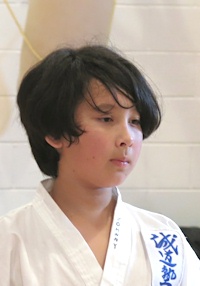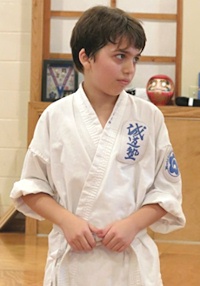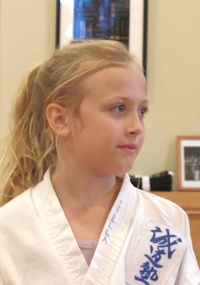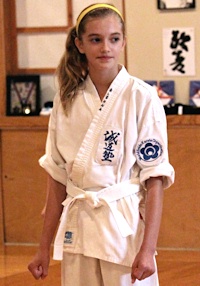2020 February
2018 December August June February
2017 December September June March
2016 November August June March
2015 December October July May February
2014 December October July April February
2013 December October August May February
2012 December September July April February
2011 December September July April February
from the October, 2013 issue of Kiai!
Junior Black Belt Photos
and Pearls from Their Essays
On the morning of Saturday, October 5, 2013 five young Thousand Waves students were tested for junior black belt. Alenna Abbatemarco and Lilit Matar, both 12-year-olds who have trained in Seido Karate since they were 4 & 5 years old, were promoted to junior nidan (2nd-degree black belt). Promoting to junior shodan (1st-degree black belt) were Johnny Hollowed (11), Stella Ljung (10) and Ruben Whitaker (11). All three have trained for around five or six years.
Following are some photos of highlights from their test, accompanied by excerpts ("pearls") from the essays which were part of their promotion requirements.
Johnny Hollowed
On how karate is like and unlike a sport: "Karate is like a sport because there is sparring that's a competition. Sometimes it is fun to win trophies and ribbons when I have done well. Karate is more than a sport because in karate you not only learn how to spar, but you learn how to deal with problems. We learn the Seido way. Kaicho refers to the dojo as a place of enlightenment because the dojo is a place for gaining knowledge and earning respect."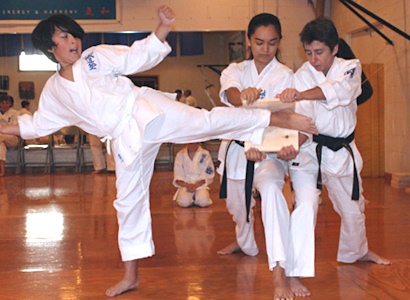
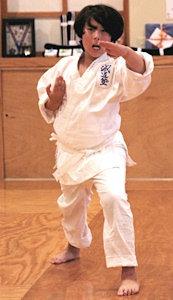
Ruben Whitaker
"Seido was founded on love, respect, and obedience. Love means you care about someone or you are very passionate about something. Love is extravagant. It comes from deep inside the heart. Respect is when appreciation and kindness are shown in actions toward someone or something. … Obedience is the act of obeying something you are supposed to do or obeying your parents or somebody that has more life experience than you. It is also adhering to principles and values that you believe in."

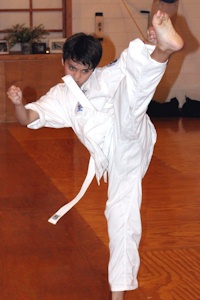
Stella Ljung
"At a dojo, you try to find your inner part. … You find your inner part because you are all wearing the same outfits so that everybody is equal. Also, if everybody is wearing the same [uniform], it is not about your outfit but who you are inside and how much effort you put into training that makes you special. The dojo is a community where it is not all about you as one person getting ahead, but instead about the whole group working together."
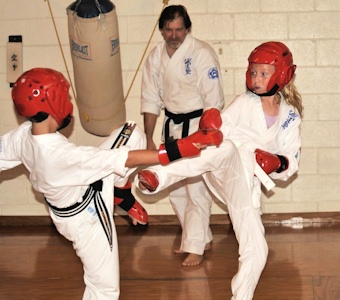
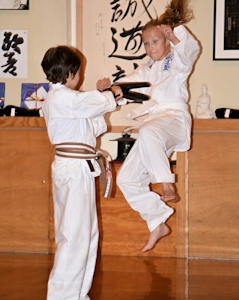
Alenna Abbatemarco
"Being strong to me, means being physically and mentally strong. … Being physically strong to me, means more than having muscles, abs and biceps. It means to be able to take something, like a punch, but also being able to fight back for what you think is right. … Being mentally strong is a whole different kind of strong. It is being able to tell yourself in your head that everything is going to be ok. It is having confidence in yourself that you can accomplish something, even when it seems you may not accomplish it. It is making sure that nothing can bring you down, that you are strong and nothing can break that. It also can help you build up that extra confidence to be physically strong. "
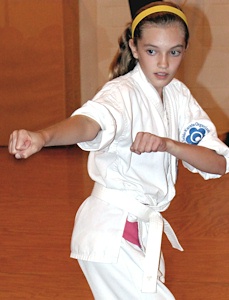
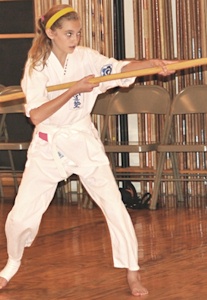
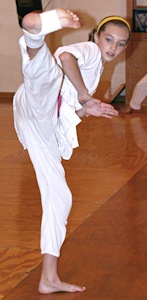
Lilit Matar
"In his book The Human Face of Karate, Kaicho asks, “What does strong mean to an individual karateka?” In my opinion, to individual karateka, strong means that they are able to protect themselves when they have to. It also means that they know that fighting is not always the answer, and they should try to get out of dangerous situations with their voices and not with their physical karate skills."
"In karate, I have not only learned the physical part of the curriculum. I have also learned that attention, concentration, thinking and respect are things that I learn in the dojo that I should use in all parts of my life"
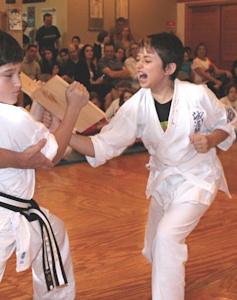

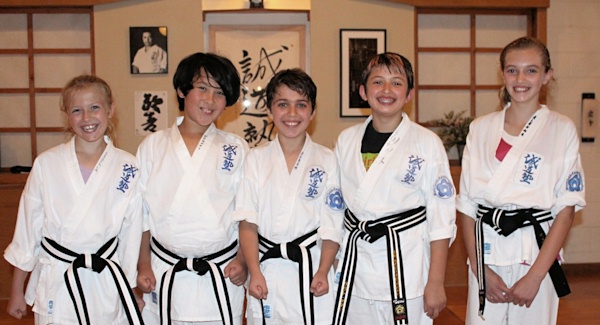
Left to right: Senpai Stella Ljung, Senpai Johnny Hollowed, Senpai Ruben Whitaker, Senpai Lilit Matar and Senpai Alenna Abbatemarco.

